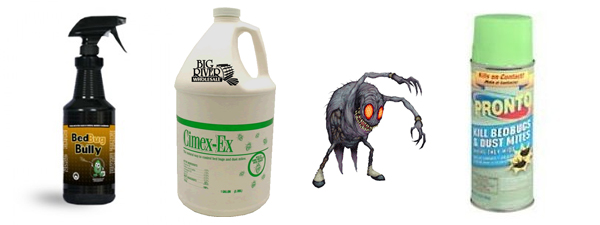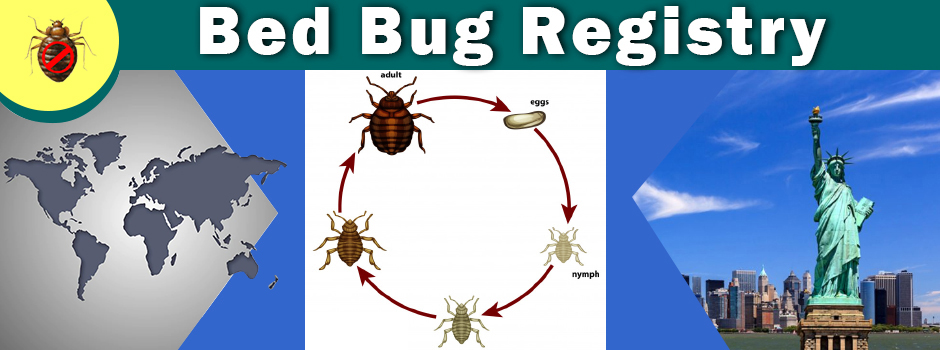Pesticides
 With the widespread use ofDDTin the 1940s and'50s, bed bugs mostly disappeared from North America in the mid-twentieth century .Infestations remained common in many other parts of the world and in recent years have also begun to rebound in North America. Thanks to rises in rampant hoarding around the United States,[clarification needed]bed bugs are able to hide and reproduce without immediate detection. Reappearance of bed bugs has presented new challenges for pest control due to their developed resistance to various pesticides including DDT, and organophosphates.In fact, using DDT on today's bed bug makes it more active.
With the widespread use ofDDTin the 1940s and'50s, bed bugs mostly disappeared from North America in the mid-twentieth century .Infestations remained common in many other parts of the world and in recent years have also begun to rebound in North America. Thanks to rises in rampant hoarding around the United States,[clarification needed]bed bugs are able to hide and reproduce without immediate detection. Reappearance of bed bugs has presented new challenges for pest control due to their developed resistance to various pesticides including DDT, and organophosphates.In fact, using DDT on today's bed bug makes it more active.

Another reason for their increase is that more pest control services use gel-based pesticide baits for control of cockroaches and ants, the most common pests in structures, instead of residual sprays. When residual sprays were used to kill the more common insect pests, they resulted in the collateral control of bed bug populations. The gel-based insecticides primarily used today to control cockroach and ant populations do not have any effect on bed bugs, as bed bugs are not attracted to baits.
 Available in the market are several pesticides to control bed bugs. The list of pesticides for the purpose can be a long one, and you may easily access them or buy them in the market. But professional help from pest control operators are necessary because small failures and mistakes in applying pesticides to control bed bugs may cause more serious problems. The list of pesticides to control bed bugs is ever growing. Every year a handful of additional insecticides make the list longer. This acknowledges how people are concerned with the increasing annoyance and discomfort from having bed bugs at home.
Available in the market are several pesticides to control bed bugs. The list of pesticides for the purpose can be a long one, and you may easily access them or buy them in the market. But professional help from pest control operators are necessary because small failures and mistakes in applying pesticides to control bed bugs may cause more serious problems. The list of pesticides to control bed bugs is ever growing. Every year a handful of additional insecticides make the list longer. This acknowledges how people are concerned with the increasing annoyance and discomfort from having bed bugs at home.
One theory is that the source of current bed bug populations is from other countries without bed bug pesticides that have made their way through air travel, and another theory is that the surviving bed bug populations were forced to switch hosts to birds such aspoultry, andbats.
The most common pesticides and insecticides, from the long list of available ones in the market, for controlling bedbugs usually are classified as:
1. Contact insecticides. These substances have their own long list. Most bed bugs pesticides contain a number of contact insecticides that have the ability to kill bed bugs instantly when they come or get into direct contact with surfaces with the pesticide or its residues.
2. Contact insecticides are normally made up of pyrethoids, which are formulated synthetically or from natural extracts from chrysanthemum flowers. These substances tend to emit smell that instantly knocks out bed bugs. However, bed bugs may develop repelling properties or characteristics against the substance. Hence, using contact insecticides may not mean killing bed bugs, but preventing them from getting into surfaces applied with the pesticide.
3. Insect growth regulators or IGR. These insecticide is also common among the long list of pesticides for controlling bed bugs. The pesticide does not directly target adult or crawling bed bugs. The pesticide's attack on bedbugs is based on the principle that the youngsters are more vulnerable. IGRs affect and directly exterminate eggs or bed bugs that have just hatched. The eggs' and the young bed bugs's development are hindered and stalled, thus, no new generation of bed bugs will follow the current one. IGR application is not a quick way to control bed bugs. From among the other pesticides in the currently existing list, IGR is the slowest, or the insecticide that will have results in the longest time.
AC_AX_RunContent( 'width','480','height','385','src','https://www.youtube.com/v/hBsXA4Oe1qI&hl=en_US&fs=1&','type','application/x-shockwave-flash','allowscriptaccess','always','allowfullscreen','true','movie','https://www.youtube.com/v/hBsXA4Oe1qI&hl=en_US&fs=1&' ); //end AC code
List of pesticides that control bed bugs
The list of pesticides to control bed bugs is ever growing. Every year a handful of additional insecticides make the list longer. This acknowledges how people are concerned with the increasing annoyance and discomfort from having bed bugs at home. The most common pesticides available in the market are: Pyrethrins, Tempo, Allethrin, Delta Dust Flee/ Dragnet, Malathion, Drione Dust and Suspend SC. The list is very incomplete, but the above mentioned are the most common and easily purchasable in the market today. The short listed pesticides are commonly sprayed into areas suspected of being habitat for bed bugs.
- Treating Bed Bug With chemicals [Last Updated On: September 19th, 2022] [Originally Added On: September 19th, 2022]
- Symptoms Picture Gallery [Last Updated On: September 20th, 2022] [Originally Added On: September 20th, 2022]
- Bed Bug Products [Last Updated On: September 21st, 2022] [Originally Added On: September 21st, 2022]
- Simplified Bed Bug Preparation [Last Updated On: September 22nd, 2022] [Originally Added On: September 22nd, 2022]
- Quality Pest Control Methods [Last Updated On: September 23rd, 2022] [Originally Added On: September 23rd, 2022]
- Pajamas Diminish Bed Bug Bites [Last Updated On: September 24th, 2022] [Originally Added On: September 24th, 2022]
- Bed Bug Picture Gallery [Last Updated On: September 25th, 2022] [Originally Added On: September 25th, 2022]
- Male and Female Bed Bugs [Last Updated On: September 27th, 2022] [Originally Added On: September 27th, 2022]
- Affordable Bed Bug Registry Detection Method [Last Updated On: September 28th, 2022] [Originally Added On: September 28th, 2022]
- Introduction About Bed Bug [Last Updated On: September 29th, 2022] [Originally Added On: September 29th, 2022]
- Insect Bed Bug [Last Updated On: September 30th, 2022] [Originally Added On: September 30th, 2022]
- Welcome to Bed Bug Registry Database [Last Updated On: December 3rd, 2022] [Originally Added On: October 1st, 2022]
- How to Kill Bed Bugs [Last Updated On: October 2nd, 2022] [Originally Added On: October 2nd, 2022]
- How Bed Bug Bite [Last Updated On: October 3rd, 2022] [Originally Added On: October 3rd, 2022]
- Get Rid of Bed Bugs [Last Updated On: October 4th, 2022] [Originally Added On: October 4th, 2022]
- DDT for Bed Bugs [Last Updated On: October 5th, 2022] [Originally Added On: October 5th, 2022]
- Control Bed Bugs [Last Updated On: October 6th, 2022] [Originally Added On: October 6th, 2022]
- Contact Us [Last Updated On: October 7th, 2022] [Originally Added On: October 7th, 2022]
- Box Spring Treatment [Last Updated On: October 8th, 2022] [Originally Added On: October 8th, 2022]
- Bed Bug Products [Last Updated On: October 9th, 2022] [Originally Added On: October 9th, 2022]
- Bed Bug Products [Last Updated On: October 10th, 2022] [Originally Added On: October 10th, 2022]
- Bed Bug Wall or Baseboard [Last Updated On: October 11th, 2022] [Originally Added On: October 11th, 2022]
- Bed Bug Videos [Last Updated On: December 5th, 2022] [Originally Added On: October 12th, 2022]
- Bed Bug Treatment Synergy [Last Updated On: October 13th, 2022] [Originally Added On: October 13th, 2022]
- Bed Bug Treatment and Removal, How it is done [Last Updated On: October 14th, 2022] [Originally Added On: October 14th, 2022]
- Bed Bug Transmit Disease [Last Updated On: October 15th, 2022] [Originally Added On: October 15th, 2022]
- Bed Bug Tape [Last Updated On: October 16th, 2022] [Originally Added On: October 16th, 2022]
- Bed Bug Products [Last Updated On: October 17th, 2022] [Originally Added On: October 17th, 2022]
- Bed Bug Sniffing Dogs [Last Updated On: October 18th, 2022] [Originally Added On: October 18th, 2022]
- Bed Bug Spray - Non Toxic [Last Updated On: October 19th, 2022] [Originally Added On: October 19th, 2022]
- Bedbug Species [Last Updated On: October 20th, 2022] [Originally Added On: October 20th, 2022]
- Bed Bug Products [Last Updated On: October 21st, 2022] [Originally Added On: October 21st, 2022]
- Bed Bug Products [Last Updated On: October 22nd, 2022] [Originally Added On: October 22nd, 2022]
- Bed Bug Repellent [Last Updated On: October 24th, 2022] [Originally Added On: October 24th, 2022]
- Bed Bug Products [Last Updated On: October 25th, 2022] [Originally Added On: October 25th, 2022]
- Bed Bug Products [Last Updated On: October 26th, 2022] [Originally Added On: October 26th, 2022]
- Bed Bug Products [Last Updated On: October 27th, 2022] [Originally Added On: October 27th, 2022]
- Bed Bug Pillow Case Encasement Covers [Last Updated On: October 29th, 2022] [Originally Added On: October 29th, 2022]
- Bed Bug Products [Last Updated On: October 30th, 2022] [Originally Added On: October 30th, 2022]
- Bed Bug Network [Last Updated On: October 31st, 2022] [Originally Added On: October 31st, 2022]
- Bed Bug Molting [Last Updated On: November 1st, 2022] [Originally Added On: November 1st, 2022]
- Bed Bug Mattress Encasement Protector Covers [Last Updated On: November 2nd, 2022] [Originally Added On: November 2nd, 2022]
- Bed Bug Look Like [Last Updated On: November 3rd, 2022] [Originally Added On: November 3rd, 2022]
- Advanced Bed Bug Preparation [Last Updated On: November 4th, 2022] [Originally Added On: November 4th, 2022]
- Bed Bug Wall or Baseboard [Last Updated On: November 5th, 2022] [Originally Added On: November 5th, 2022]
- Bedbug Legislation [Last Updated On: November 6th, 2022] [Originally Added On: November 6th, 2022]
- Bed bug Knowledge [Last Updated On: November 7th, 2022] [Originally Added On: November 7th, 2022]
- Bed Bug Products [Last Updated On: November 8th, 2022] [Originally Added On: November 8th, 2022]
- Bedbug in Hotel [Last Updated On: November 9th, 2022] [Originally Added On: November 9th, 2022]
- Bedbuig in Clothes, Fabrics [Last Updated On: November 11th, 2022] [Originally Added On: November 11th, 2022]
- Bedbug History [Last Updated On: November 12th, 2022] [Originally Added On: November 12th, 2022]
- Bedbug Hiding PLaces [Last Updated On: November 13th, 2022] [Originally Added On: November 13th, 2022]
- Bed Bug Nesting Location [Last Updated On: November 14th, 2022] [Originally Added On: November 14th, 2022]
- Bed Bug Products [Last Updated On: November 15th, 2022] [Originally Added On: November 15th, 2022]
- Bedbug Feedings [Last Updated On: November 16th, 2022] [Originally Added On: November 16th, 2022]
- Bed Bug Products [Last Updated On: November 17th, 2022] [Originally Added On: November 17th, 2022]
- Bedbug Epidemic [Last Updated On: December 3rd, 2022] [Originally Added On: November 18th, 2022]
- Bed Bug Eggs and Nymphs [Last Updated On: November 19th, 2022] [Originally Added On: November 19th, 2022]
- Bed Bug Distribute [Last Updated On: November 20th, 2022] [Originally Added On: November 20th, 2022]
- Bed Bug Discrimination [Last Updated On: November 21st, 2022] [Originally Added On: November 21st, 2022]
- Bed Bug Products [Last Updated On: November 22nd, 2022] [Originally Added On: November 22nd, 2022]
- Bed Bug Colony [Last Updated On: November 23rd, 2022] [Originally Added On: November 23rd, 2022]
- Bed Bug Products [Last Updated On: November 24th, 2022] [Originally Added On: November 24th, 2022]
- Bed Bug Products [Last Updated On: November 25th, 2022] [Originally Added On: November 25th, 2022]
- Bed Bug Box Spring Encasement Covers [Last Updated On: November 26th, 2022] [Originally Added On: November 26th, 2022]
- Bed Bug Bites Pictures [Last Updated On: November 27th, 2022] [Originally Added On: November 27th, 2022]
- Bedbug Bites [Last Updated On: December 3rd, 2022] [Originally Added On: November 28th, 2022]
- Bed Bug Products [Last Updated On: November 29th, 2022] [Originally Added On: November 29th, 2022]
- Bed Bug Products [Last Updated On: December 3rd, 2022] [Originally Added On: November 30th, 2022]
- Allergy Sentry Box Spring Encasement [Last Updated On: December 1st, 2022] [Originally Added On: December 1st, 2022]
- Affordable Bed Bug Detection Method [Last Updated On: December 5th, 2022] [Originally Added On: December 2nd, 2022]
- Advanced Bed Bug Preparation [Last Updated On: December 3rd, 2022] [Originally Added On: December 3rd, 2022]
- Adult Bed Bugs [Last Updated On: December 3rd, 2022] [Originally Added On: December 4th, 2022]











